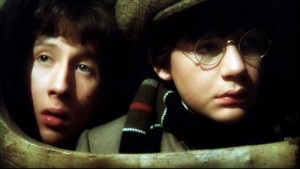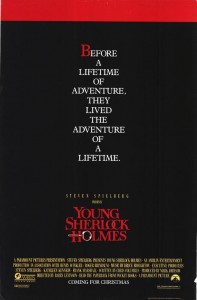 On December 4th, Young Sherlock Holmes turns 25. Unlike its other ’85 Amblin alumni The Goonies and Back to the Future, there probably won’t be much hype over this particular anniversary; there unfortunately won’t be any special edition Blu-ray reissues or photo shoots for Entertainment Weekly.
On December 4th, Young Sherlock Holmes turns 25. Unlike its other ’85 Amblin alumni The Goonies and Back to the Future, there probably won’t be much hype over this particular anniversary; there unfortunately won’t be any special edition Blu-ray reissues or photo shoots for Entertainment Weekly.
As I’ve previously rambled about in this column, Young Sherlock Holmes was a milestone in one important aspect of modern cinema, being the first film to combine CGI with live-action footage in a photorealistic manner. In the sequence, a clergyman experiences a hallucination in which the image of a knight in a stained-glass window comes to life. The figure leaps to the floor, raises its sword, and then impressively moves past the camera in one continuous shot.
[kml_flashembed movie="http://www.youtube.com/v/CT-qV41ovv4" width="600" height="344" allowfullscreen="true" fvars="fs=1" /]
Young Sherlock Holmes was written by Chris Columbus, who at the time was only known for first writing Gremlins in 1984 (also an Amblin production) and also for writing the screenplay for The Goonies. Columbus of course would go on to direct Home Alone (1990) and the first two Harry Potter movies (Sorcerer’s Stone in 2001 and Chamber of Secrets in 2002) where he significantly helped to establish the look of the series.
 Columbus’s screenplay manages to simultaneously be an engaging mystery while cleverly establishing aspects of Holmes’s life, such as the origin of the familiar hat, the pipe, and also the reason why Holmes remains a bachelor for the rest of his life. In addition, the story is narrated by Watson just like most of the original Arthur Conan Doyle stories.
Columbus’s screenplay manages to simultaneously be an engaging mystery while cleverly establishing aspects of Holmes’s life, such as the origin of the familiar hat, the pipe, and also the reason why Holmes remains a bachelor for the rest of his life. In addition, the story is narrated by Watson just like most of the original Arthur Conan Doyle stories.
The story imagines what would have happened if Holmes (Nicholas Rowe) and Watson (Alan Cox) had met as young men while at a boarding school. There is a character named Dudley (Earl Rhodes) who provides ample rivalry for Holmes — in fact that aspect of the story doesn’t quite play out as one might think. There is also Holmes’s mentor Professor Waxflatter (Nigel Stock) and also Waxflatter’s daughter Elizabeth (Sophie Ward), whose attention Dudley vies for, but whose interests clearly lie with Holmes.
The young mostly unknown cast is very impressive and despite the somewhat disappointing box office, I was always surprised that no one’s career really took off from this. A few years ago I saw Nicholas Rowe in a British film called Enigma (2001) but he was only in one or two scenes. Oh well, at least he’s still working.
 The director was Barry Levinson, known at the time only for the acclaimed character study Diner (1982) and the Robert Redford baseball fable The Natural (1984). After Young Sherlock Holmes, Levinson would go on to win an Oscar for directing Rain Man (1988).
The director was Barry Levinson, known at the time only for the acclaimed character study Diner (1982) and the Robert Redford baseball fable The Natural (1984). After Young Sherlock Holmes, Levinson would go on to win an Oscar for directing Rain Man (1988).
Young Sherlock Holmes was criticized for having a plot too close to Spielberg’s own Indiana Jones and the Temple of Doom (1984), but I’ve always felt the storyline of Holmes uncovering a strange Egyptian cult to be very much in the spirit of the original Arthur Conan Doyle stories. Besides, the temple ceremonies allowed for composer Bruce Broughton to write a couple of terrific Carl Orff-inspired choral pieces that I cannot help but attempt to air-conduct whenever I hear them.
I’ve wondered lately, in this time of frequent franchise reboots, whether this film would have fared better had it been released now. As a character, Mr. Holmes is currently enjoying two separate reboots: the 2009 Guy Ritchie film starring Robert Downey Jr. and the acclaimed 2010 BBC series Sherlock set in present-day London. The Guinness Book of World Records continually lists Sherlock Holmes as the most portrayed movie character in film history.
Oh, if you do end up checking out the film and you enjoy how elements of Holmes’s future life are established, be sure to stick through the closing credits where one more important piece of the puzzle is revealed.




Comments